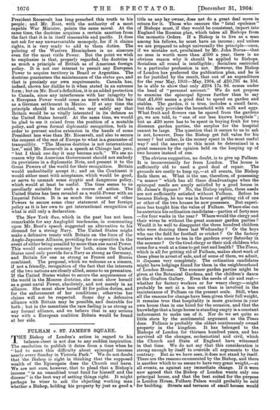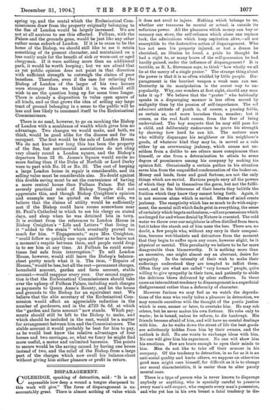T HE Bishop of London's action in regard to his balance-sheet
is not due to any sudden inspiration. The resolution to publish it dates from a time when he "had to meet this difficulty about episcopal incomes nearly every Sunday in Victoria Park." We do not doubt that the Bishop is right in thinking that the supposed wealth of the Episcopate does the Church real harm. We are not sure, however, that to plead that a Bishop's income "is an unaudited trust fund for himself and the diocese" is the best way of setting things right. It might perhaps be wiser to ask the objecting working man whether a Bishop, holding his property by just as good a title as any lay owner, does not do a great deal more in return for it. Those who censure the "fatal opulence" of Bishops must, if they would be consistent, import into England the Russian plan, which takes all Bishops from the monastic Orders. If a Bishop is to live as a man among his fellows, he must have an income ; and unless we are prepared to adopt universally the principle—once, if we mistake not, proclaimed by Mr. John Burns—that no man is worth more than .2500 a year, there is no obvious reason why it should be applied to Bishops. Socialism all round is intelligible ; Socialism restricted to a particular profession is not. However, the Bishop of London has preferred the publication plan, and he is so far justified by the result, that out of an expenditure for the year May, 1903—May, 1904, of £10,795 4s. 10d. he is able to show that only £294 17s. 8d. comes under the head of "personal account." We do not propose to examine the episcopal figures further than to say that .21,600 seems a good deal to spend on garden and stables. The garden, it is true, includes a small farm, but this only provides the household with milk and eggs. What fruit and flowers can be spared from the gardens go, we are told, to "one of our less known hospitals " ; but as £20 more has to be spent in buying fruit for two diocesan garden parties, the surplus for the hospital cannot be large. The question that it occurs to us to ask is not, however, Does the Bishop get full value for his money ? but rather, Is the money spent in the most useful way ? and the answer to this must be determined in a great measure by the opinion held on the keeping up of two houses instead of one.
The obvious suggestion, no doubt, is to give up Fulham. It is inconveniently far from London. The house is sufficiently old to need a good deal of repair. The grounds are costly to keep up,—at all events, the Bishop finds them so. What is the use, therefore, of possessing "a manor" which has all these disadvantages when the episcopal needs are amply satisfied by a good house in St. James's Square ? No, the Bishop replies, these needs are not sufficiently satisfied without Fulham. Before he became Bishop, he too was in favour of getting rid of one or other of the two houses he now possesses. But experi- ence has taught him the value of Fulham. Where else can lie entertain his ordination candidates—parties of forty men —for four weeks in the year ? Where would the clergy and their wives be without the great summer garden parties ? Would it be well to disappoint the three hundred children who were dancing there last Wednesday ? Or the boys who use the field for football or cricket ? Or the factory workers who come to tea in the gardens every Saturday in the summer? Or the tired clergy or their sick children who come for a week at a time to get rest and health? The Times, which is all for getting rid of Fulham, makes short work of these pleas in arrest of sale, and of some of them, we admit, it disposes very completely. The ordination candidates might have lodgings found for them in the neighbourhood of London House. The summer garden parties might be given at the Botanical Gardens, and the children's dance at the Grafton Gallery. Even the needs of air and rest— whether for factory workers or for weary clergy—might probably be met at a less cost than is involved in the maintenance of Fulham on the present scale. Still, when all the reasons for change have been given their full weight, it remains true that hospitality is more gracious in your own house than in one hired for the occasion, and that the knowledge that a large house is standing empty is a constant inducement to make use of it. Nor do we set quite so little store by the sentimental argument as the Times does. Fulham is probably the oldest continuously owned property in the kingdom. It has belonged to the Bishops of London for thirteen hundred years, and has survived all the changes, ecclesiastical and civil, which the Church and State of England have witnessed in that time. We do not say that this consideration is strong enough by itself to override all arguments to the contrary. But as we have seen, it does not stand by itself. There are the reasons enumerated by the Bishop, and there is another which to us seems to have very great weight,---at all events, as against any immediate change. If it were now agreed that the Bishop of London wants only one principal house, and that the best suited for the purpose is London House, Fulham Palace would probably be sold for building. Streets and terraces of small houses would spring bp, and the rental which the Ecclesiastical Com- missioners draw from the property originally belonging to the See of London would be largely increased. We are not at all anxious to see this effected. Fulham, with the Palace and the grounds gone, would be just like any other rather mean suburb of London. If it is to cease to be the home of the Bishop, we should still like to see it retain something of its present character, and maintained on a less costly scale for the benefit of sick or worn-out or aged clergymen. If it were nothing more than an additional park, it would be worth keeping ; but we are afraid that as yet public opinion does not point in that direction with sufficient strength to outweigh the claims of poor benefices. Therefore, even if the case for relieving the Bishop of London of the larger of his two houses were stronger than we think it is, we should still wish to see the question hung up for some time longer. There is already a disposition to value open spaces of all kinds, and as that grows the idea of selling any large tract of ground belonging in a sense to the public will be less and less likely to commend itself to the Ecclesiastical Commissioners.
There is no need, however, to go on mocking the Bishop of London with a semblance of wealth which gives him no advantage. Two changes we would make, and both, we think, would be good alike for the diocese and for its occupant. The first would be the sale of London House. We do not know how long this has been the property of the See, but sentimental associations do not cling very .closely round a London square, and the Bishop's departure from 32 St. James's Square would excite no more feeling than if the Duke of Norfolk or Lord Derby were to part with No. 31 or No. 33. The cost of keeping a large London house in repair is considerable, and its selling value must be considerable also. No doubt against this double saving must be set the convenience of having a more central house than Fulham Palace. But the severely practical mind of Bishop Temple did not appreciate this, and though Bishop Creighton's opinion and example may be quoted on the other side, we believe that the claims of utility would be sufficiently met if the Bishop could have rooms somewhere near St. Paul's Cathedral in which to see his clergy on stated days, and sleep when he was detained late in town. It is evident from the references to London House in Bishop Creighton's " Life and Letters " that living in it "added to the strain" which eventually proved too much for him. "Engagements," says Mrs. Creighton, "could follow so quickly one upon another as to leave not a moment's respite between them, and people could drop in to see him at any time. At Fulham he could some- times feel safe from interruption." To sell London House, however, would still leave the Bishop's balance- sheet pretty much what it is. The item, "Repairs of Houses," would be less, but all the rest—permanent charges, household account, garden and farm account, stable account—would reappear every year. Our second sugges- tion is that the Ecclesiastical Commissioners should take over the upkeep of Fulham Palace, including such charges as payments to Queen Anne's Bounty, and let the house and grounds to the Bishop for an equivalent rent. We - believe that the able secretary of the Ecclesiastical Com- mission would effect an appreciable reduction in the number of gardeners, and in the £723 9s. 6d. at which the "garden and farm account" now stands. Which pay- ments should still be left to the Bishop to make, and which should be included in the rent, would be a matter for arrangement between him and the Commissioners. The stable account it would probably be best for him to pay, as he would best know the relative advantages of four horses and two carriages, or, what we fancy he might find more useful, a motor and unlimited hansoms. The points to secure would be the saving caused by having one house instead of two, and the relief of the Bishop from a large part of the charges which now swell his balance-sheet without giving him either pleasure or profit in return.
DISPARAGEMENT.



































 Previous page
Previous page